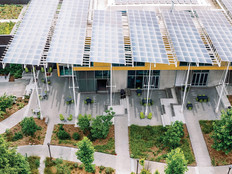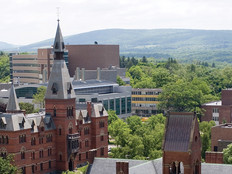The National Science Foundation has awarded the University of Arizona a five-year, $26 million grant to develop quantum networking technologies. The technologies are expected to transform medicine, finance, data security, artificial intelligence, autonomous systems and smart devices.
“Less than a year ago, a quantum computer for the first time performed certain calculations that are no longer feasible for even the largest conventional supercomputers,” Saikat Guha, an associate professor in the UArizona James C. Wyant College of Optical Sciences who will direct the project, said in a news release. “The quantum internet will allow for applications that will never be possible on the internet as we know it.”
Unlike the current internet, where computers around the globe exchange data encoded in familiar 0s and 1s, the quantum internet will use a global network of quantum processors that communicate with one another through qubits, the basic unit of quantum information.
“Who knows, 50 years from now, your internet service provider may send a technician to your house to install [a UArizona]-patented quantum-enabled router that does everything your current router does, but more,” Guha said. “It lets you hook up your quantum gadgets to what we are beginning to build today — the new internet of the future.”
“As a leading international research university bringing the Fourth Industrial Revolution to life, we are deeply committed to (our strategic plan to) advance amazing new information technologies like quantum networking to benefit humankind,” UArizona President Robert C. Robbins said in the release. “And we are equally committed to examining the complex, social, legal, economic and policy questions raised by these new technologies.”











